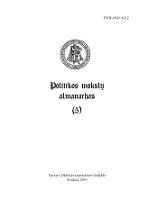TARPTAUTINIŲ SANTYKIŲ DISCIPLINOS RAIDA IR KETVIRTIEJI TARPPARADIGMINIAI GINČAI
THE DEVELOPMENT OF THE DISCIPLINE OF INTERNATIONAL RELATIONS AND THE FOURTH INTER-PARADIGM DEBATE
Author(s): Ieva KarpavičiūtėSubject(s): Politics / Political Sciences
Published by: Vytauto Didžiojo Universitetas
Keywords: TARPTAUTINIŲ SANTYKIŲ DISCIPLINOS RAIDA IR KETVIRTIEJI TARPPARADIGMINIAI GINČAI; THE DEVELOPMENT OF THE DISCIPLINE OF INTERNATIONAL RELATIONS AND THE FOURTH INTER-PARADIGM DEBATE
Summary/Abstract: The development of the discipline of International Relations depends on certain theoretical, methodological, epistemological, and ontological fashion as well as on the phases of debate between existing theoretical approaches. The formation of discipline of International Relations can be analyzed in the framework of inter-paradigm debate. Those debates evaluate the development of the discipline, give sense to the existence of the discipline and form the guidelines for further development. The discipline of International Relations is evolving in the line of four inter-paradigm debates; first was between idealism and realism, the second between traditionalism and behaviourism, the third among neo-liberalism, neo-marxism, and neo-realism, and the fourth between rationalism and reflectivism. Each stage of those inter-paradigm debates, mark the certain stage of the development of International Relations. Analysis of those debates – can be seen as the self reflection of the discipline‘s. This article analyse the significance of fourth debate to the development of International Relations and the evaluation of prospects for further development. The third debate showed that neo-realism and neo-liberalism are not incommensurable paradigms; on the contrary, they employ the same rational, positivistic principles of research, they have the similar research agendas. Those theories are strongly related in ontological, epistemological, and methodological spheres. During those third inter-paradigm debates emerged the idea of neo-neo synthesis. Debates were no longer relevant. And finally as the opposition to this neo-neo synthesis appeared the group (post-positivistic, post-modernistic, critical theories) distinguished by R.Keohane as reflectivism. Reflectivism emerged as an opposition to positivistic neo-realism and neo-liberalism (distinguished as rationalism). From the beginning reflectivism was met with the hope and optimism, it was expected that the appearance of this group of theories should firmly lead to the progress of the International Relations. The debates between rationalism and reflectivism showed incommensurability of those theories and highlighted the substantial epistemological, ontological and methodological differences. The gap between those paradigms appeared very soon. Besides there emerged trends of fragmentation within reflectivism and rationalism. Despite of the optimism that existed in the beginning of the fourth debate, present trends reflect the gloomy reality. The variety of theories and the strong segmentation determine the fragmentation of the discipline as such and limit the possibilities for innovations and progress. Each theory has its own narrow research agenda and the new ideas which do not match the theory are not welcome. Unfortunately that produces the interception of new ideas and innovations, and determines the stagnation of the discipline.
Journal: Politikos mokslų almanachas
- Issue Year: 2009
- Issue No: 05
- Page Range: 99-120
- Page Count: 22
- Language: Lithuanian

